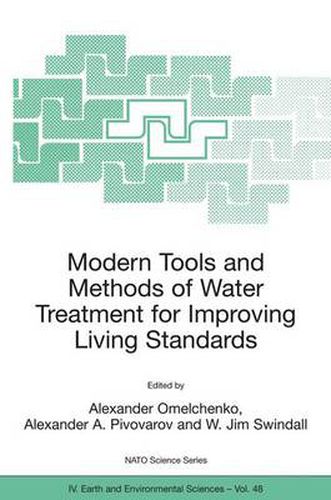Readings Newsletter
Become a Readings Member to make your shopping experience even easier.
Sign in or sign up for free!
You’re not far away from qualifying for FREE standard shipping within Australia
You’ve qualified for FREE standard shipping within Australia
The cart is loading…






This title is printed to order. This book may have been self-published. If so, we cannot guarantee the quality of the content. In the main most books will have gone through the editing process however some may not. We therefore suggest that you be aware of this before ordering this book. If in doubt check either the author or publisher’s details as we are unable to accept any returns unless they are faulty. Please contact us if you have any questions.
Providing the population of the Earth with safe drinking water is one of the biggest challenges of modern society. In recognition of this problem the United Nations Organization and UNESCO declared 2003 to be the International Year of Freshwater. On November 19-22, 2003, the NATO Advanced Research Workshop (ARW) on "Modern Tools and Methods of Water Treatment for Improving Living Standards" took place in Dnepropetrovsk, Ukraine. Thirty-one participants from 15 countries including Bulgaria, Canada, Croatia, Czech Republic, Denmark, Italy, Lithuania, Moldova, Poland, Romania, Russia, UK, Ukraine, USA, and Uzbekistan attended the meeting. They discussed the scientific concepts and practical means for the solution of the complex social, economic and ecological problems associated with water purification, consumption, conservation, and protection. They also established a network of scientists and specialists to foster further collaboration and the exchange of ideas. The location of the ARW was chosen quite deliberately. The city of Dnepropetrovsk is located on the banks of the Dnieper River and it has a population of about 1. 3 million people. As it is one of the largest industrial centers, it shares all the environmental problems, which are found in the modern Ukraine. In 2001, one in seven of the water samples taken from Ukrainian industrial and drinking water supply systems did not meet sanitary-hygienic standards, and one in twelve did not meet microbiological standards.
$9.00 standard shipping within Australia
FREE standard shipping within Australia for orders over $100.00
Express & International shipping calculated at checkout
This title is printed to order. This book may have been self-published. If so, we cannot guarantee the quality of the content. In the main most books will have gone through the editing process however some may not. We therefore suggest that you be aware of this before ordering this book. If in doubt check either the author or publisher’s details as we are unable to accept any returns unless they are faulty. Please contact us if you have any questions.
Providing the population of the Earth with safe drinking water is one of the biggest challenges of modern society. In recognition of this problem the United Nations Organization and UNESCO declared 2003 to be the International Year of Freshwater. On November 19-22, 2003, the NATO Advanced Research Workshop (ARW) on "Modern Tools and Methods of Water Treatment for Improving Living Standards" took place in Dnepropetrovsk, Ukraine. Thirty-one participants from 15 countries including Bulgaria, Canada, Croatia, Czech Republic, Denmark, Italy, Lithuania, Moldova, Poland, Romania, Russia, UK, Ukraine, USA, and Uzbekistan attended the meeting. They discussed the scientific concepts and practical means for the solution of the complex social, economic and ecological problems associated with water purification, consumption, conservation, and protection. They also established a network of scientists and specialists to foster further collaboration and the exchange of ideas. The location of the ARW was chosen quite deliberately. The city of Dnepropetrovsk is located on the banks of the Dnieper River and it has a population of about 1. 3 million people. As it is one of the largest industrial centers, it shares all the environmental problems, which are found in the modern Ukraine. In 2001, one in seven of the water samples taken from Ukrainian industrial and drinking water supply systems did not meet sanitary-hygienic standards, and one in twelve did not meet microbiological standards.